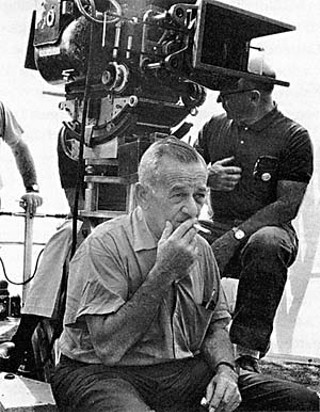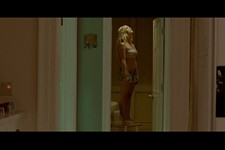When It Felt True
The 'enigma' of William Wyler
By Raoul Hernandez, Fri., Oct. 15, 2010

The eight Oscar nominations for 1946's The Best Years of Our Lives – and seven statuettes, including those for picture, director, actor, and screenplay – didn't include a nod to grande dame Myrna Loy, who took the high road in her autobiography four decades later despite never having received a single Academy Award nomination during her 55-year film career. About the director, however – William Wyler – she minced no words:
"My only reservation about doing that picture concerned working with William Wyler," wrote the actress, "because of stories from Bette Davis and other actors about his endless retakes and bullying. 'I hear Wyler's a sadist,' I told Sam."
Samuel Goldwyn, a movie producer from when movie producers put their onscreen credit after the director's, played it off.
"'That isn't true,' he replied, with a genuine Goldwynism, 'he's just a very mean fellow.'"
"Willy" Wyler had a reputation all right.
"I'd seen Willy be very hard on other people in the two previous pictures we did together," offers Myrna Loy's co-star Teresa Wright in the former's memoir, Myrna Loy: Being and Becoming. "He could wear people down with the amount of takes he'd make."
Apparently it worked, too. Wyler remains the most nominated director in the ledger of Tinseltown accolades, one Oscar for directing shy of John Ford's four, and tied with Frank Capra at three. Wyler was recognized in the category more than both of them combined. Ford and Capra each took home Best Picture and director only once. All three of Wyler's directing trophies – for 1942's Mrs. Miniver, 1956's The Best Years of Our Lives, and 1959's Ben-Hur – were matched by a Best Picture win. His other nods were for Dodsworth (1936), Wuthering Heights (1939), The Letter (1940), The Little Foxes (1941), The Heiress (1949), Detective Story (1951), Roman Holiday (1953), Friendly Persuasion (1956), and The Collector (1965). Save perhaps for Bette Davis tempest The Letter, one of three films the screen demon made with Wyler, the director's 12 nominations constitute their own graduate film course.
Wyler wasn't in it for the ego. The Swiss-German Jew from Alsace-Lorraine (born in 1902 and first cousin once removed to Carl Laemmle, who founded Universal) also holds the record for most actor nominations in his films (36), starting in 1936 with Dodsworth, when Walter Huston was nominated as the titular husband in a crumbling marriage. Nearly 30 years later, Samantha Eggar opposite baby-faced Terence Stamp in The Collector crowned the director's accolade streak by foreshadowing the Oscar fusillade of The Silence of the Lambs in her nominated performance as a cellar captive.
Of the seven Best Actor and Best Actress Academy Awards in Wyler's oeuvre, the ladies take it in five. William Wyler's Desperate Hours: A Director's Drama, the Austin Film Society's latest Essential Cinema series, spotlights three of them: Bette Davis (Jezebel), Greer Garson (Mrs. Miniver), and Olivia de Havilland (The Heiress). First-time Oscar walk-offs Audrey Hepburn (Roman Holiday) and Barbra Streisand (Funny Girl) complete the squad, though not this particular Director's Drama. Leave the comedies to Billy Wilder.
Lighter fare united Wyler and Hepburn two out of three times together, but the actress never warms to Peter O'Toole in Technicolor caper How To Steal a Million (1966), and she's miscast in Lillian Hellman's sapphic scare The Children's Hour (1961) – a remake of the director's first censored attempt at the material in 1936, These Three. Look instead to coltish Teresa Wright, a film series in her own right, standing chin up to Bette Davis in another ruthless Hellman play, The Little Foxes, then snatching Best Actress in a Supporting Role honors for Mrs. Miniver and finally graduating to its World War II bookend, The Best Years of Our Lives, for which Fredric March won his second gold tie clip while Myrna Loy got air.
"As for Willy's legendary penchant for retakes," acknowledged Loy in her 1987 book, "I experienced it only once. ... We did it over and over again, every possible way – upside down, backward, everything – without ever satisfying him."
Daughter Catherine Wyler's documentary Directed by William Wyler, the subject of which died three days after being interviewed in July 1981, explains the cineaste's so-called sadism with expert witnesses.
"He was an amazingly inarticulate man about what he wanted," states Bette Davis flatly.
"That's the enigma of Wyler," accents Willy Wyler's doppelgänger to the cinematically dyslexic, Billy Wilder. "He was not a particularly well-read man. As a matter of fact, he hated reading. He was not a particularly studious man. He had no idea about Strasberg methods, about Russian theatre. There was just an instinct in him that told him when it was right. When it felt true."
"A genius," trumpets John Huston, Wyler's lifelong friend, "for getting the truth out of an actor. Getting his very best performance. A most sophisticated thing Willy was after."
Billy Wilder: "There was a finesse in that guy, which you would not expect if you just talked to him across a card table – where you talked to him most of the time."
Counsellor at Law (1933), Wyler's first screen gem and one of John Barrymore's last great roles, finesses a crudely effective, not-so-slow boil out of its star's volcanic talent. Kirk Douglas – another great profile – gnashes out a terrific turn in the one-act, two-room cop drop Detective Story, a canon sleeper alongside The Collector. Likewise, Humphrey Bogart, nearly two decades after a vicious comeuppance in Wyler's Dead End (1937), loosens a raw home invasion in The Desperate Hours (1955), his second to last film. All are rabid iconography for the ages.
Bogie's brick wall in The Desperate Hours, Fredric March, inspired AFS' new Wyler cycle. The five entries of I Married a Witch: Fredric March's Comic Curse in 2008 – which ended with The Best Years of Our Lives – left The Desperate Hours on the cutting room floor for obvious (and murderous) reasons. That series' proposed follow-up, a John Barrymore grouping, couldn't score 35mm prints that film archives and movie studios are more and more reluctant to lend out now – except for Counsellor at Law, which AFS landed. William Wyler directed the two films, and I curated both roundups.
Hopefully Myrna Loy's next.
AFS Essential Cinema
William Wyler's Desperate Hours: A Director's Drama
Films screen Tuesdays, 7pm, at the Alamo Drafthouse South (1120 S. Lamar). For ticket info and program notes, see www.austinfilm.org.
Oct. 19: Counsellor at Law
Oct. 26: Jezebel
Nov. 2: Mrs. Miniver
Nov. 9: The Heiress
Nov. 16: The Desperate Hours













